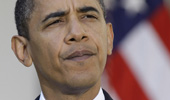
The president is a wonderful speechmaker, of that there is little doubt. To his credit, he acknowledged the controversy surrounding him receiving the award, and the uncomfortable body language of directing two wars as he accepts the world’s most important prize for peace.
A few passages were of particular note. Early in the speech Obama said:
Moreover, wars between nations have increasingly given way to wars within nations. The resurgence of ethnic or sectarian conflicts; the growth of secessionist movements, insurgencies, and failed states — all these things have increasingly trapped civilians in unending chaos. In today’s wars, many more civilians are killed than soldiers; the seeds of future conflict are sown, economies are wrecked, civil societies torn asunder, refugees amassed, children scarred.
There is little to quibble with here in the rhetoric, but the language makes it sound like deadly conflict has been increasing around the globe in recent years, which it largely has not. The number of wars and failed states has dropped dramatically since the early 1990s, despite the fact that the world may seem more conflict-prone because U.S. troops are now engaged in both Iraq and Afghanistan.
Throughout the speech, Obama worked around the concept of just war, and the international norms for the use of force. As he said:
When there is genocide in Darfur, systematic rape in Congo, repression in Burma — there must be consequences. Yes, there will be engagement; yes, there will be diplomacy — but there must be consequences when those things fail. And the closer we stand together, the less likely we will be faced with the choice between armed intervention and complicity in oppression.
Not much later in the speech he added:
Let me also say this: The promotion of human rights cannot be about exhortation alone. At times, it must be coupled with painstaking diplomacy. I know that engagement with repressive regimes lacks the satisfying purity of indignation. But I also know that sanctions without outreach — condemnation without discussion — can carry forward only a crippling status quo. No repressive regime can move down a new path unless it has the choice of an open door.
On balance, the formulation makes sense if I am reading it properly: there should be diplomacy even with repressive states, but these repressive states must also face real consequences for their behavior. In looking at the example of Sudan, we certainly see efforts by the administration to engage in diplomacy (albeit at a far less senior level than would be ideal), but we have not seen much in the way of consequences to date. As the world has repeatedly learned, both parts of the formulation need to be in place for it to work. Diplomacy with dictators rarely results in change absent meaningful pressures, and using coercion and even force without a diplomatic strategy is just bloody-minded.
Photo: President Barack Obama.

